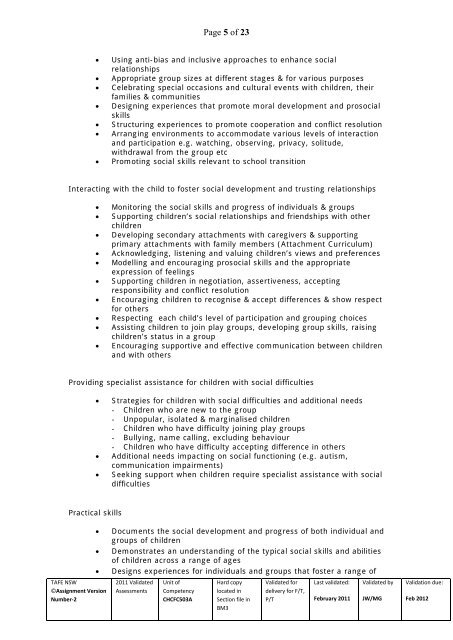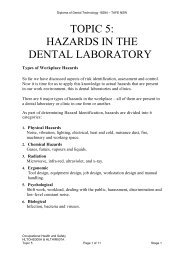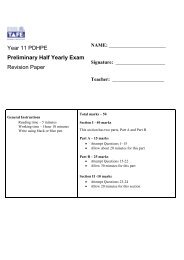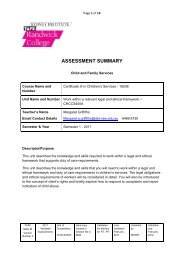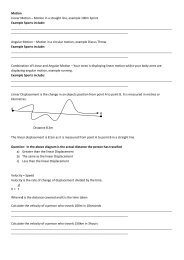CHCFC503A - Randwick College Wiki
CHCFC503A - Randwick College Wiki
CHCFC503A - Randwick College Wiki
Create successful ePaper yourself
Turn your PDF publications into a flip-book with our unique Google optimized e-Paper software.
Page 5 of 23<br />
• Using anti-bias and inclusive approaches to enhance social<br />
relationships<br />
• Appropriate group sizes at different stages & for various purposes<br />
• Celebrating special occasions and cultural events with children, their<br />
families & communities<br />
• Designing experiences that promote moral development and prosocial<br />
skills<br />
• Structuring experiences to promote cooperation and conflict resolution<br />
• Arranging environments to accommodate various levels of interaction<br />
and participation e.g. watching, observing, privacy, solitude,<br />
withdrawal from the group etc<br />
• Promoting social skills relevant to school transition<br />
Interacting with the child to foster social development and trusting relationships<br />
• Monitoring the social skills and progress of individuals & groups<br />
• Supporting children’s social relationships and friendships with other<br />
children<br />
• Developing secondary attachments with caregivers & supporting<br />
primary attachments with family members (Attachment Curriculum)<br />
• Acknowledging, listening and valuing children’s views and preferences<br />
• Modelling and encouraging prosocial skills and the appropriate<br />
expression of feelings<br />
• Supporting children in negotiation, assertiveness, accepting<br />
responsibility and conflict resolution<br />
• Encouraging children to recognise & accept differences & show respect<br />
for others<br />
• Respecting each child’s level of participation and grouping choices<br />
• Assisting children to join play groups, developing group skills, raising<br />
children’s status in a group<br />
• Encouraging supportive and effective communication between children<br />
and with others<br />
Providing specialist assistance for children with social difficulties<br />
• Strategies for children with social difficulties and additional needs<br />
- Children who are new to the group<br />
- Unpopular, isolated & marginalised children<br />
- Children who have difficulty joining play groups<br />
- Bullying, name calling, excluding behaviour<br />
- Children who have difficulty accepting difference in others<br />
• Additional needs impacting on social functioning (e.g. autism,<br />
communication impairments)<br />
• Seeking support when children require specialist assistance with social<br />
difficulties<br />
Practical skills<br />
TAFE NSW<br />
©Assignment Version<br />
Number-2<br />
• Documents the social development and progress of both individual and<br />
groups of children<br />
• Demonstrates an understanding of the typical social skills and abilities<br />
of children across a range of ages<br />
• Designs experiences for individuals and groups that foster a range of<br />
2011 Validated<br />
Assessments<br />
Unit of<br />
Competency<br />
<strong>CHCFC503A</strong><br />
Hard copy<br />
located in<br />
Section file in<br />
BM3<br />
Validated for<br />
delivery for F/T,<br />
P/T<br />
Last validated:<br />
February 2011<br />
Validated by<br />
JW/MG<br />
Validation due:<br />
Feb 2012


